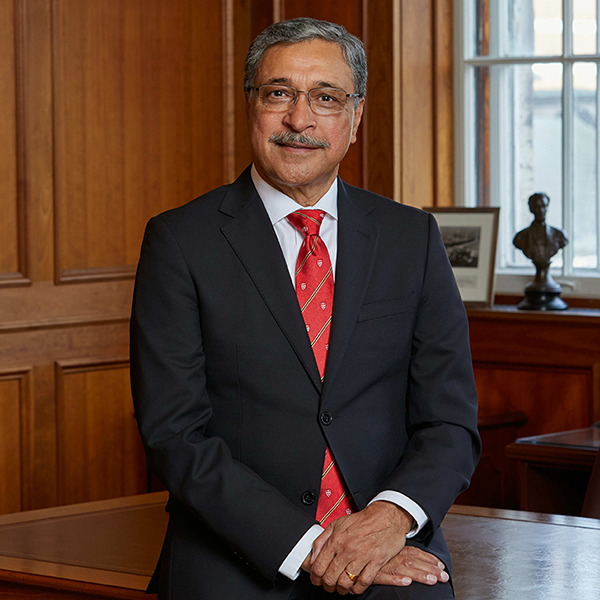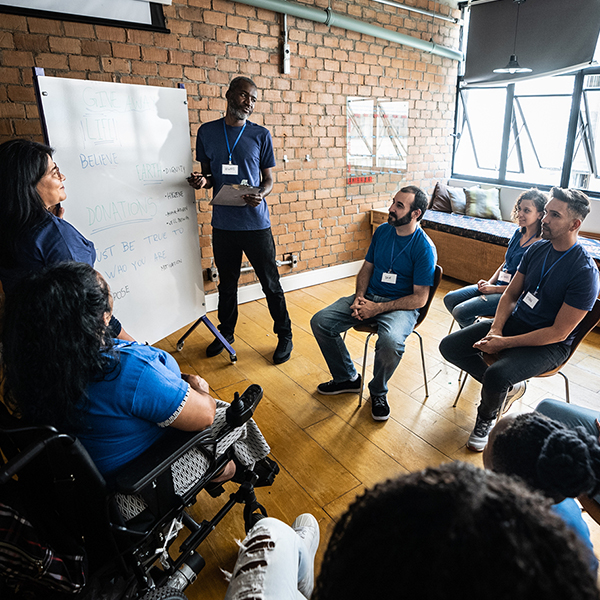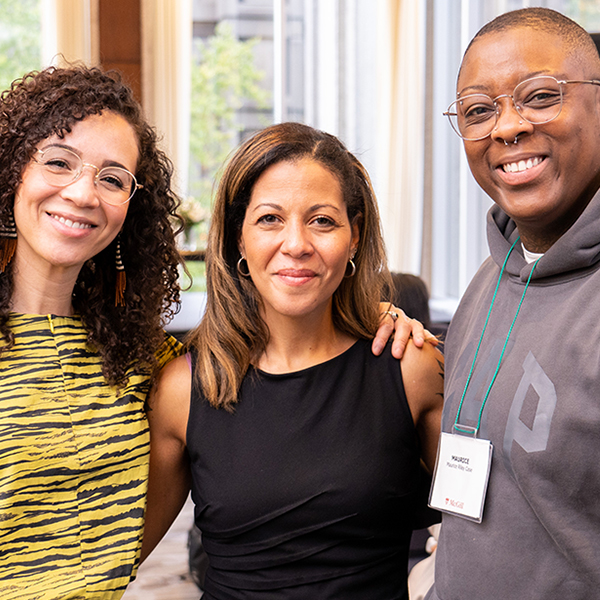“Historians don’t run away from complexities,” says Melissa Shaw. In her postdoctoral work at McGill, she has had more than enough complexity to dive into. She is researching the lives of the enslaved Black persons in the household of James McGill, whose bequest led to the creation of the university that now bears his name.
The University’s website includes a brief biography of James McGill, with the following information: “At various times, the McGill household owned at least five enslaved Black and Indigenous people: Jack or Jacques, a Black man (c1760-1838); Sarah, a Black woman (c1763-1809); Marie-Louise, a Black woman who had joined the household as a girl (c1765-1789); an Indigenous boy whose name is unknown (c1768-1778); Marie Potamiane, an Indigenous girl (c1773-1783). …”
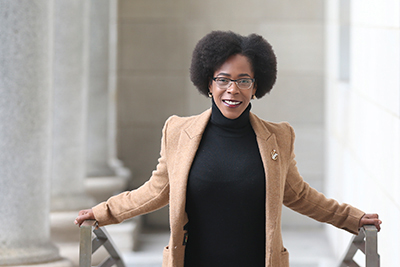
Credit: Christinne Muschi
A scholar of Black Canadian history, Shaw is one of McGill’s Provostial Research Scholars in Institutional Histories, Slavery, and Colonialism (the other is Joana Joachim). The two posts were created in advance of McGill’s 2021 Bicentennial, with the mandate to examine the University’s connections to colonialism and the transatlantic slave trade.
James McGill’s 1821 bequest of £10,000 led to McGill’s founding. This wealth itself was tied to the colonial economic system. McGill’s website states: “The University acknowledges the deep, long-lasting adverse impacts that these practices have exerted on Black and Indigenous communities.”
“History requires a lot of digging and a lot of time,” says Shaw. But how to research the life of an enslaved person? Shaw explains that she delves into similar records as other historians but asks very different questions. “What was the scope of their responsibilities? How did they survive this slave system?”
She aims to uncover and contextualize the human beings objectified as commodities in an enslaver’s ledgers, bills of sale, and will.
Shaw has been working in the McGill Archives. She also plans to travel to Scotland and the Caribbean to investigate how James McGill’s wealth from the fur trade may have been augmented by the importation and trade of goods from enslaved-labour plantations in the West Indies.
Reckoning with the past
McGill is one of many universities across Canada, the U.S., and Europe now investigating their past. The early histories of many such institutions include some thorny elements.
How should McGill address its past? “The most important thing we can do is be honest,” says Provost and Vice-Principal (Academic) Christopher Manfredi. Appointed in 2015, Manfredi quickly initiated several key efforts to demonstrate the University’s commitment to reconciliation.
In 2016, the Hochelaga Rock was moved to a place of honour, just inside the Roddick Gates. Originally installed in 1925 by Parks Canada on the lower field of the downtown campus, the five-tonne granite rock commemorates the Iroquois who helped Jacques Cartier and his men survive the winter of 1535.
Michael Loft, BSW’84, MSW’07, a retired lecturer at McGill’s School of Social Work and a member of the Mohawk nation at Kahnawà:ke, had campaigned for the rock to be moved to a more prominent location.
“We must not forget that story,” Loft told the McGill Reporter. “It’s a healing story.”
Manfredi also launched the Provost’s Task Force on Indigenous Studies and Indigenous Education. The Final Report, published in 2017, lists 52 calls to actions currently in progress. University-wide land acknowledgements (both spoken and written) reference the fact that McGill exists “on land which has long served as a site of meeting and exchange amongst Indigenous peoples, including the Haudenosaunee and Anishinabeg nations.”
And in 2018, McGill began an annual tradition of flying a flag depicting the Hiawatha Wampum Belt — a sacred, centuries-old symbol representing unity among the Seneca, Cayuga, Onondaga, Oneida, and Mohawk, the five original Haudenosaunee nations. Every year on National Indigenous Peoples Day, the purple and white flag is raised atop the McCall MacBain Arts Building.
Remembering forgotten stories
While McGill continues to celebrate the achievements of its best-known icons – the familiar names like Rutherford, Osler and Penfield – the University’s Bicentennial website has also focused attention on the accomplishments of a broader range of McGillians, such as Dr. William Wright, an 1848 graduate of medicine and the first person of colour to earn a medical degree in British North America; Thomas Daniel Green (Kanyen’kehàka of Six Nations), an 1882 engineering graduate and one of McGill’s first Indigenous students; Juanita Corinne DeShield, BA’36, the first Canadian-born Black woman to graduate from McGill; and Evie Ikidluak, BEd’71, McGill’s first Inuk graduate.
“It’s not about erasing the existing stories,” says Manfredi. “It’s about making sure we’re telling the stories that we haven’t told as loudly as we should have.”
One example is the Charles R. Drew Graduate Fellowships, established at McGill last June in honour of Charles Drew, MDCM’33, a pioneering Black surgeon and scientist known as the “father of blood banking” for his trailblazing work on the long-term preservation of blood plasma. These fellowships will provide financial support for graduate students at McGill who are the alumni of Historically Black Colleges and Universities in the U.S.
An action plan for McGill’s future
In September 2020, McGill published its Action Plan to Address Anti-Black Racism. The document maps out ambitious, five-year goals relating to the student experience, research and knowledge, community outreach, workforce, and physical spaces.
“There’s great momentum behind this work. The McGill community is very supportive and interested in realizing the commitments we have made to equity, reconciliation and anti-racism,” says Associate Provost (Equity and Academic Policies) Angela Campbell, BA’95, BCL’99, LLB’99. She oversees campus-wide initiatives that ensure greater access for all under-represented groups in the McGill community.
“Accountability in relation to equity, diversity, and inclusion is essential practice for higher education,” says Campbell. “And by not spotting and removing barriers to full and fair access to our campus and the learning community, we would be depriving ourselves of enormous talent at McGill, within our student body, our professoriate, and our staff.”
In spite of the challenges posed by the pandemic, McGill moved ahead with active recruitment of exceptional Black and Indigenous scholars across multiple disciplines. Eight Indigenous faculty members have been hired in the past two years, and 15 new Black faculty were appointed in 2020/21.

on McGill’s Anti-Black Racism Action Plan.
A notable new hire is American political scientist Terri Givens. Author of Radical Empathy: Finding a Path to Bridging Racial Divides, and a scholar of comparative politics, Givens also brings deep experience in university leadership, most recently as the past provost of Menlo College in California.
Givens joined McGill last July for a dual role — as a professor in the Department of Political Science and as the Provost’s Academic Lead and Advisor on McGill’s Anti-Black Racism Action Plan. “One of the reasons I’ve come to McGill is that this initiative has support from the leadership,” says Givens. “McGill is a high-profile institution, and it can lead the way if we are willing to be bold in creating change.”
She notes that many institutions released statements after the murder of George Floyd in May 2020. “McGill not only made a statement, it also quickly put out the Action Plan, working with key stakeholders,” Givens says. “It’s extremely important that McGill is taking this step.”
Givens will support initiatives for the recruitment, retention, mentoring, and support of Black academic staff. She will also serve as McGill’s liaison with Universities Studying Slavery, a global consortium based at the University of Virginia. She engages regularly with the Dr. Kenneth Melville Black Faculty and Staff Caucus, a collective of Black professors and staff members at McGill.
Givens works with a newly established team that involves the Office of the Provost and Vice-Principal (Academic), Student Services, Enrolment Services and Teaching and Learning Services. As the team’s program manager, Karen Diop is overseeing the implementation of the Action Plan. “McGill is making bold moves. It’s very exciting,” says Diop, who began her new post last May.
“The tides are changing”
While Givens and Diop are new to McGill, Antoine-Samuel Mauffette Alavo had already worked at the University for eight years when he began his current role last January as the inaugural Black Student Affairs Liaison. “I provide one-on-one advising for Black students so they can be successful and do well at the University,” says Mauffette Alavo, BA’07.
He’s working on many new initiatives to enhance the Black student experience, such as undergraduate internships that provide research opportunities and community outreach programs that encourage more Black high school students in Montreal to think of pursuing university studies at McGill. He’s also developing a new alumni event to follow the annual Black Grad ceremony, as a way to connect recent graduates with alumni.
The McGill Black Alumni Association recently launched a new initiative that will also encourage those types of connections. The McGill Black Mentorship Program, organized in conjunction with the Subcommittee on Racialized and Ethnic Persons of the McGill Joint Board-Senate Committee on Equity and the McGill Alumni Association, will give Black students (both undergraduates and graduate students) the opportunity to receive support and guidance from Black alumni, faculty, and staff.
When he was a student at McGill, Mauffette Alavo remembers often being the only Black person in class. “And, certainly, the only Black student from Montreal,” he adds. “Students are excited to have a position like mine in place. They’ve been told, ‘Oh, McGill is not a place for us.’” Mauffette Alavo hopes to help change that narrative.
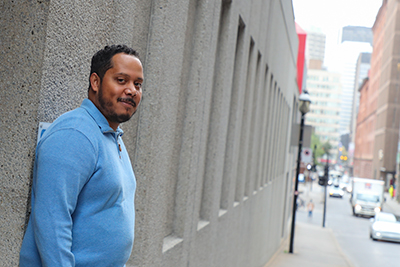
is McGill’s Black Student Affairs Liaison.
Credit: Christinne Muschi
One of his first priorities was to establish a new Black student space on the downtown campus that will be used for meetings and small-scale events. He notes there are currently at least a dozen Black student groups across campus, including the Black Students Network and the McGill African Students Society. The new space, located in the Ferrier Building, had its official opening on December 1.
“We’re trying to foster a sense of belonging and a safe community of learning for Black students,” says Mauffette Alavo. “There’s still a lot of work to do, but the tides are changing.”
Embedding Indigeneity
Created in response to McGill’s 52 calls to action, Indigenous Initiatives in the Office of the Provost and Vice-Principal (Academic) is the central unit that works to embed Indigeneity across all aspects of university life. Its website (mcgill.ca/indigenous) provides updates on the University’s 52 calls to action.
Bicentennial special events have featured the participation of elder Charlie Patton, retired social work lecturer Michael Loft, faithkeeper Kevin Deer, CertNNEd’92, BEd’96, and Inuk/Mohawk singer and songwriter Beatrice Deer. A land acknowledgement video was produced for use across McGill’s campuses, with a vocal and drum performance by Shakorennawis Doxtador-Swamp.
The 10th annual Indigenous Awareness Weeks took place last September and included a video celebration of McGill’s annual Pow Wow, launched 20 years ago by Ellen Gabriel, a Mohawk activist and artist from Kanehsatà:ke Nation (Turtle Clan), and the former head of First Peoples’ House, a downtown community centre for McGill’s Indigenous students that aims to be a “home away from home.”
At this year’s raising of the Hiawatha Wampum Belt flag, Principal Suzanne Fortier, BSc’72, PhD’76, announced a new partnership between McGill’s Gault Nature Reserve and the Grand Conseil de la Nation Waban-Aki. The agreement ensures that the nation’s members have free access to the nature reserve, their ancestral territory.
During convocation, First Nations, Inuit, and Métis students now receive a ceremonial scarf with Indigenous symbols by Kahnawà:ke-based designer Tammy Beauvais.
In 2021, McGill launched Indigenous Writer-in-Residence and Artist-in-Residence programs, and the McGill Visual Arts Collection now offers a virtual tour of Indigenous art on both campuses.
Last May, the Faculty of Law created the position of Assistant Dean (Inclusion–Black and Indigenous Flourishing), filled by Kimberly Lee-Louis, BCL/LLB’13, to lead efforts in recruiting and supporting Black and Indigenous law students.
Law has also added three Indigenous faculty members since 2017. “A major step,” says Dean of Law Robert Leckey, BCL’02, LLB’02. A mandatory first-year course on Indigenous Legal Traditions was recently introduced in the Faculty, the point of which, says Leckey, is to emphasize to students that “this, too, is law.”
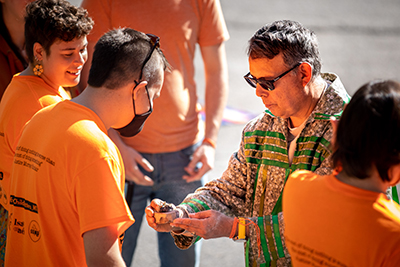
a member of the Yonkton Sioux Tribe of South Dakota, took part in a smudging ceremony at McGill on the National Day for Truth and Reconciliation.
Credit: Owen Egan and Joni Dufour
Increasingly, Indigenous subjects and perspectives are making their way into McGill’s curriculum. The Faculty of Arts is the home of the Indigenous Studies Program. The Faculty of Education’s Office of First Nations and Inuit Education is involved in a variety of community-based teacher programs. The Indigenous Health Professions Program in the Faculty of Medicine and Health Sciences trains Indigenous health professionals and strives to educate other students about the health needs of Indigenous peoples. And the Centre for Indigenous Peoples’ Nutrition and Environment at Macdonald Campus has a long track record of collaborating with Indigenous communities.
Thanks, in part, to a recent $3 million gift from Gerald Rimer, BCom’56, and his family, McGill will be launching the Institute for Indigenous Research and Knowledges. The future institute will include an Indigenous Language Reclamation and Revitalization Lab to help preserve and grow Indigenous languages and cultures. Plans for the institute also include language labs, training and on-site knowledge keepers, as well as events and symposia, among other initiatives.
A welcoming space
Aneeka Anderson is a part-time projects and communications officer with Indigenous Initiatives and a fourth-year undergraduate studying political science and anthropology. She is also the former co-chair of the Indigenous Student Alliance at McGill. “The Indigenous community at McGill and the Indigenous students that I’ve met here have really been a pillar [for me],” says Anderson, an Inuk who grew up in Ottawa. “They’ve grounded me and supported me.”
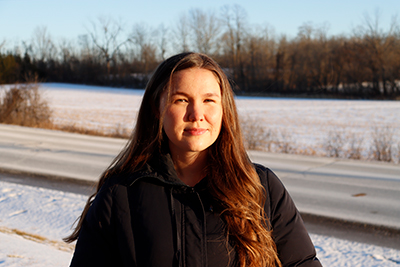
Anderson has spent time living at the First People’s House. “It’s a great resource, whether you just show up for Soup and Bannock (a weekly lunch held there) or use it more regularly,” she says. “Just knowing that there is a space for the community that’s safe and welcoming makes a real difference.”
It isn’t unusual for new students to struggle with adapting to the demands of university life, notes Anderson, but the challenges can be particularly acute for some Indigenous students. “We don’t want people to drop out because they feel that they don’t belong here. That’s why having culturally appropriate support can be huge – whether that’s from an Indigenous counsellor, an elder, or other students.”
Cindy Blackstock, MMgmt’03, a professor in the School of Social Work and an advocate for the rights of Indigenous children, spoke during last fall’s McGill Homecoming. The webinar was broadcast on September 29, the day before Canada’s first National Day for Truth and Reconciliation.
A member of the Gitxsan First Nation, Blackstock urged McGill to do “the hard, historical work” to come to terms with its past. Such efforts are essential if the University wants to encourage more First Nations, Métis, and Inuit students to enroll at McGill. “We have to create a space that truly welcomes,” said Blackstock in the webinar. “In order to do that, we must tell the truth about ourselves, and we must engage in reconciliation.”
The next 200 years
Manfredi praises the McGill community for rallying around the Indigenous Task Force’s 2017 report and the Action Plan to Address Anti-Black Racism. “I’ve been quite heartened by the way in which the community has embraced both these initiatives that are trying to push the University forward.”
Provostial Research Scholar Melissa Shaw plans to present aspects of her research in a McGill colloquium scheduled for the spring. She’ll publish her findings and expand upon this important work as an emerging scholar and researcher at McGill.
In the fall, Shaw will join McGill’s professoriate as an assistant professor in the Department of History and Classical Studies. One of two tenure-track Black professors in her department, she’ll teach two classes on Black Canadian history. “Black Canadian history is not a sub-set of Canadian history. It’s a field in itself,” says Shaw.
Change begins when people approach challenging conversations about large and complex topics with integrity, says Shaw. “I’m glad I’m at the right time and place to be among scholars courageously making crucial interventions.”
While the Bicentennial has prompted much thinking about McGill’s past, Manfredi hopes that the milestone anniversary will also be a turning point in planning for the University’s next century. “It’s really about the future — thinking about what the McGill of the future looks like.”
